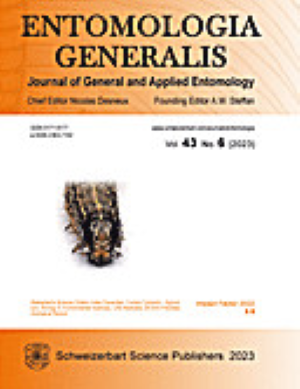对寄主植物的适应改变了表皮果蝇对其肠道细菌群落的依赖性
IF 4.6
1区 农林科学
Q1 ENTOMOLOGY
引用次数: 0
摘要
昆虫肠道微生物群落被认为是促进昆虫适应寄主植物防御的重要因素。然而,人们对寄主植物的共同进化对昆虫依赖肠道细菌群落的影响仍然知之甚少。在这项研究中,我们首先发现,在消除了 Bactrocera dorsalis、Zeugodacus cucurbitae、Zeugodacus tau 和 Bactrocera correcta 的肠道微生物后,它们的适应性有所下降,但仅限于以非偏好寄主为食的情况;在偏好寄主上没有观察到显著的适应性变化。此外,在喂食苦瓜的模拟适应期之后,葫芦茨蝇幼虫,无论是轴生、共生还是非生物,都表现出相当的适应性水平。相反,与共生幼虫和非共生幼虫相比,腋生幼虫的适应性继续下降。我们的研究结果还显示,细菌的清除改变了背壳线虫的基因表达模式,表明其在营养获取、同化、免疫和解毒过程中存在缺陷,而这些变化在葫芦蝇中并不明显。此外,我们的实验还表明,与葫芦蝇不同,背鳃蝇依靠肠道菌群对苦瓜毒素进行显著解毒。这些结果表明,Z. curbitae 可能已经发展出了独立于微生物的策略,如基因编码的解毒或耐受机制,以应对有毒宿主的挑战。本文章由计算机程序翻译,如有差异,请以英文原文为准。
Adaptation to host plants modulates the dependence of tephritid fruit flies on their gut bacterial communities
Insect gut microbial communities are recognized as important factors facilitating insect adaptation to host plant defenses. However, the impact of co-evolution with host plants on insects’ reliance on their gut bacterial communities remains poorly understood. In this study, we first showed a decrease in fitness for Bactrocera dorsalis, Zeugodacus cucurbitae, Zeugodacus tau, and Bactrocera correcta after eliminating their gut microbes, but only when they were fed on non-preferred hosts; no significant fitness changes were observed on preferred hosts. Furthermore, after a simulated adaptation period with bitter melon feeding, Z. cucurbitae larvae, whether axenic, symbiotic, or gnotobiotic, exhibited comparable fitness levels. In contrast, axenic larvae of B. dorsalis continued to display reduced fitness compared to their symbiotic and gnotobiotic counterparts. Our findings also revealed that bacterial removal altered gene expression patterns in B. dorsalis, indicating deficiencies in nutrient acquisition, assimilation, immunity, and detoxification processes, whereas these changes were less pronounced in Z. cucurbitae. Additionally, our experiments demonstrated that, unlike Z. cucurbitae, B. dorsalis relies on its intestinal flora to significantly detoxify bitter melon toxins. These results suggest that Z. cucurbitae may have developed microbe-independent strategies, such as genetically encoded detoxification or tolerance mechanisms, to cope with toxic host challenges.
求助全文
通过发布文献求助,成功后即可免费获取论文全文。
去求助
来源期刊

Entomologia Generalis
生物-昆虫学
CiteScore
7.10
自引率
18.80%
发文量
72
审稿时长
>12 weeks
期刊介绍:
Its scope covers all aspects of basic and applied research dealing with insects and more broadly with arthropods inhabiting wild, agricultural and/or urban habitats. The journal also considers research integrating various disciplines and issues within the broad field of entomology and ecology.
Entomologia Generalis publishes high quality research articles on advances in knowledge on the ecology and biology of arthropods, as well as on their importance for key ecosystems services, e.g. as biological control and pollination. The journal devotes special attention to contributions providing significant advances (i) on the fundamental knowledge and on sustainable control strategies of arthropod pests (including of stored products) and vectors of diseases, (ii) on the biology and ecology of beneficial arthropods, (iii) on the spread and impact of invasive pests, and (iv) on potential side effects of pest management methods.
Entomologia Generalis welcomes review articles on significant developments in the field of entomology. These are usually invited by the editorial board, but proposals may be sent to the Editor-in-Chief for preliminary assessment by the editorial board before formal submission to the journal. The journal also considers comments on papers published in Entomologia Generalis, as well as short notes on topics that are of broader interest.
 求助内容:
求助内容: 应助结果提醒方式:
应助结果提醒方式:


